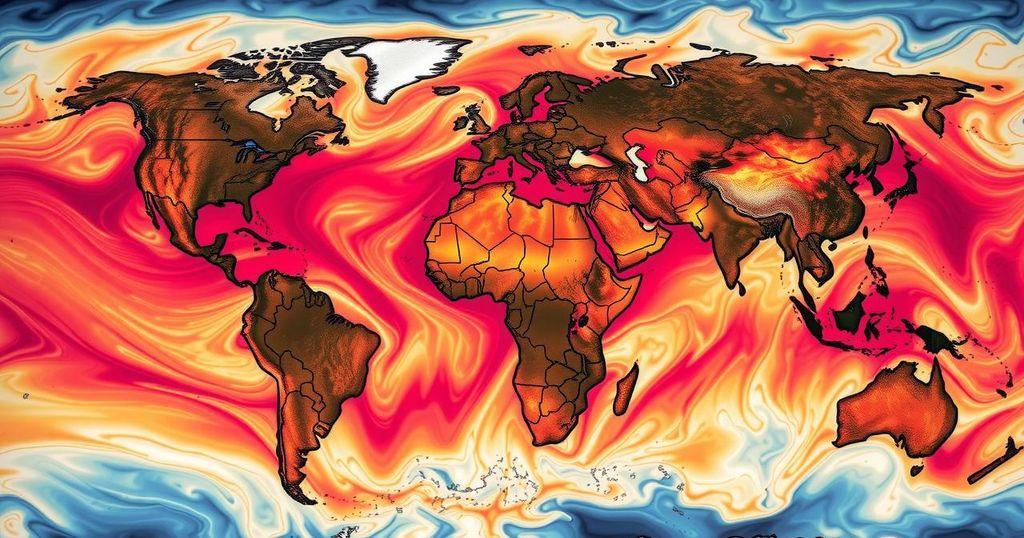Weather
AFP, AFRICA, ASIA, BEIJING, CHINA, CHINA METEOROLOGICAL ADMINISTRATION, CHONGQING, CLIMATE, EUROPE, EXTREME WEATHER, FRANCE, GLOBAL WARMING, GUANGZHOU, KENYA, MEXICO, NORTH AMERICA, PARIS, PHILIPPINES, SICHUAN, SOUTH AMERICA, SPAIN, SWISS RE, UNITED NATIONS, UNITED STATES, WEATHER, WEATHER AGENCY, WEATHER AGENCY BEIJING, WILDFIRES, YANGTZE RIVER
Aisha Khan
0 Comments
2024 Marks China’s Hottest Year On Record Amid Climate Crisis
China’s weather agency reported that 2024 was its warmest year on record, with temperatures averaging 10.92 degrees Celsius—1.03 degrees higher than average. The report highlights the increasing frequency of extreme weather events linked to climate change, including severe flooding and droughts, resulting in dozens of fatalities and significant economic losses. Globally, 2024 is labeled as the warmest year to date, necessitating urgent climate action.
In a startling announcement, China’s weather agency declared that 2024 has become the warmest year on record for the nation, with an average temperature of 10.92 degrees Celsius (51.66 Fahrenheit), surpassing previous averages by 1.03 degrees. This alarming trend coincides with rising global temperatures attributed to climate change. The China Meteorological Administration reported that the top four hottest years have occurred within the last four years, emphasizing that all ten of the warmest years since 1961 transpired in the 21st century. Throughout this year, China reported unprecedented warmth, including the hottest month of July and record-breaking heat in both August and autumn.
The United Nations indicated that 2024 is on track to become the warmest year globally. Climate change, primarily induced by fossil fuel combustion, is resulting in not only rising temperatures but also insufficient atmospheric stability. Consequently, heightened temperatures contribute to increased water vapor and ocean evaporation, leading to intensified rainfall and storms. The repercussions of these climatic alterations have been severe, causing extensive property damage and crop destruction across various regions.
In China, the climate crisis exacted a heavy toll, with numerous fatalities resulting from extreme flooding incidents. In May alone, flooding attributed to incessant rainfall resulted in the loss of 48 lives due to a highway collapse in southern China. Additionally, the city of Guangzhou faced an exceptionally lengthy summer, with state media reporting an unprecedented 240 days of average temperatures exceeding 22 degrees Celsius (71.6 degrees Fahrenheit). Regions such as Sichuan and Chongqing experienced devastating heat and drought.
Globally, 2024 bore witness to catastrophic flooding in nations like Spain and Kenya, alongside violent storms affecting the United States and the Philippines, as well as severe droughts and wildfires across regions in South America. The total economic losses due to natural disasters in 2024 amounted to approximately $310 billion, as reported by Swiss Re, a Zurich-based insurance firm. The urgent need for addressing climate change persists, given the aspirations set forth in the 2015 Paris climate accords, aiming to restrain global warming to below two degrees Celsius above pre-industrial levels.
The report by China’s meteorological authorities highlights the escalating effects of climate change, particularly manifesting in fluctuating weather patterns and extreme temperatures. As the leading emitter of greenhouse gases, China’s role in the global climate crisis is critical, with governmental pledges to peak emissions by 2030 and achieve net-zero status by 2060. The ongoing weather-related disasters are reflective of a broader trend observed worldwide, where the incidence of natural calamities has dramatically increased, causing loss of life and significant economic impact. The scientific consensus underscores the urgency of addressing climate change to mitigate further threats to global ecosystems and human livelihoods.
The recognition of 2024 as China’s hottest year on record serves as a warning about the profound impacts of climate change. The country’s escalating temperatures and related natural disasters encapsulate the urgency for global climate action. As the world grapples with the consequences of rising temperatures, the commitment to reducing greenhouse gas emissions becomes increasingly crucial to safeguarding future generations from potential catastrophes caused by environmental changes.
Original Source: www.france24.com




Post Comment